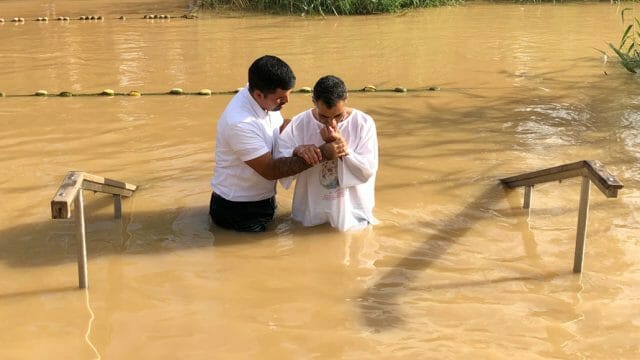An end-time focus on Jesus leaves little room for fear.

A recent online article urged the Seventh-day Adventist Church to abandon, even apologize for, its preaching on final events. Not only has our message traumatized many members, especially when they were children, but none of the predicted events—Sunday law, persecution, the mark of the beast, and so on, have so far happened.
The key phrase is “so far.” Sure, even yours truly, who joined the church about 40 years ago, never thought things would continue as long as they have. But so what? Are we going to abandon the Second Coming because it’s taking longer than we expected (see 2 Peter 3:4)?
Ellen White wrote about how, after the Fall, the Father and Son revealed to the angels in heaven that Jesus would die on the cross. “And they [the angels] should be witnesses of his humiliation and great sufferings. And as they should witness his sufferings, and the hate of men towards him, they would be stirred with the deepest emotions, and through their love for Him, would wish to rescue, and deliver Him from His murderers; but that they must not interfere to prevent anything they should behold; and that they should act a part in His resurrection; that the plan of salvation was devised, and His Father had accepted the plan.”* This scene occurred right after the Fall, yet the angels were told not to interfere in what would happen at the cross—about 4,000 years later? Come on! Four thousand years before the event, God tells them what not to do? Wasn’t there plenty of time beforehand to let them know how to act?
Besides being another amazing insight from the Spirit of Prophecy, this scene depicts a reality radically different from what we, flesh and blood beings in a four-dimensional fallen world, experience here. We are beings created in time; God is the Creator of time. We exist in time; God exists in time and, also, above and outside it—a divide that our minds can’t cross no matter how many complicated mathematical formulas about entropy or the second law of thermodynamics or general relativity we create. Human mathematics will explain the magnificence of Beethoven’s Fourth Symphony quicker than it will cross the heavenly-earthly chronological divide.
Thus, we need to be careful about imposing our narrow, limited, and painfully subjective conceptions of time on when we think that God should act. (“Well, can’t we do the same with the six days of creation really being long ages of the earth, that is, if God’s time is so different than ours?” Nice try, but: First, each one of biblical days are delineated by the phrase, “there was evening and there was morning” [Gen. 1:5, 8, 13, 19, 23, 31, ESV], which shows that it meant days as we experience them, an evening and morning, words reflective of the way earthly days were often depicted in the Bible [see Lev. 24:3; Num. 9:21; 1 Sam. 17:16]. Second, the seventh-day Sabbath, which came after the first six, is a 24-hour day, given as a sign of the first six days, and it pretty much seals the case for them being literal days as opposed to epochs. Finally, the time frame of Genesis 1 and 2 was unfurled in the context of earth and earthly time, not in heaven and heavenly time, whatever that is.)
Look, too, at the major time prophecies in the Bible: the Children of Israel in Egypt 400 years (Gen. 15:13); Daniel’s prophecy about the first coming of Jesus, 490 years (Dan. 9:24-27); the dominion of papal Rome, 1,260 years (Dan. 9:25; Rev. 12:6, 14; 13:5); the cleansing of the heavenly sanctuary after 2,300 hundred years (Dan. 8:14). These are, from our perspectives, long times; but that’s the exact problem, our perspective, which is as warped as everything else about us. For each of us, personally, individually, the end of all things is never longer than a moment of silence, a snippet of quiet darkness after death, and then we experience fully the eternal life that Jesus promised. And, because time goes by so quickly, the end for each of us comes quickly, too (Wow, that was fast after all, wasn’t it?)—no matter how long it takes for prophecy to be fulfilled.
But what about the children? What about them? Should Daniel have not warned about “a time of trouble, such as never was since there was a nation, even to that time” (Dan. 12:1, KJV) because it would scare the kiddies? Or, in deference to the children, should Jesus have not told us about “wars and rumors of wars” (Matt. 24:6) and about “famines and earthquakes” (v. 7), and that His followers would be “hated by all nations because of me” (v. 9)? And does not the book of Revelation teach that “all who refused to worship the image [would] be killed” (Rev. 13:15, NIV)?
Excuse us, as Seventh-day Adventists, for preaching the Bible.
Having not heard the three angels’ messages until the age of 23, I don’t want to minimize the fear that some at age 8 might have felt when taught final events. So, sure, maybe the trials of the end days should, around kids, be expressed in a more reassuring manner. That’s a fine and fair point. But to throw out our prophetic message because some (certainly not all) young Adventists got scared that they were going to be tortured for keeping the Sabbath?
You can’t be serious.
*Ellen G. White, Spiritual Gifts (Battle Creek, MI; Seventh-day Adventist Pub. Assn., 1858), 1:25.








